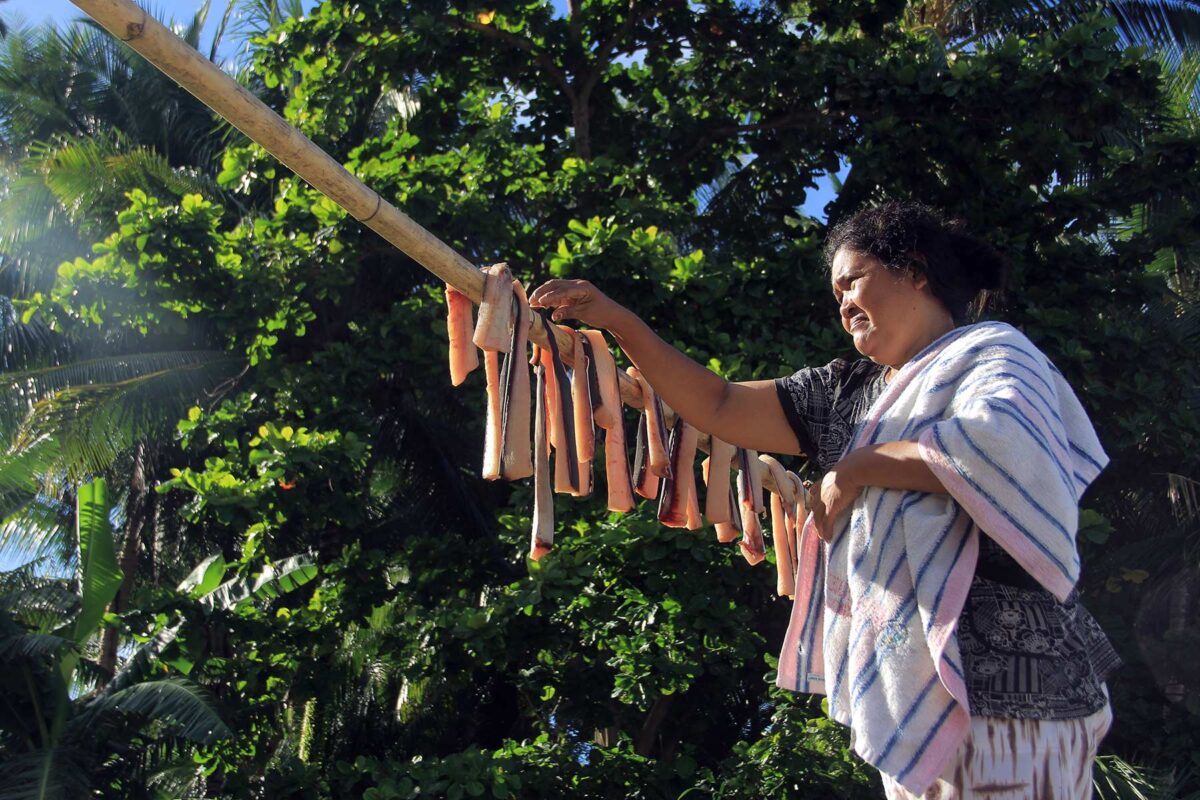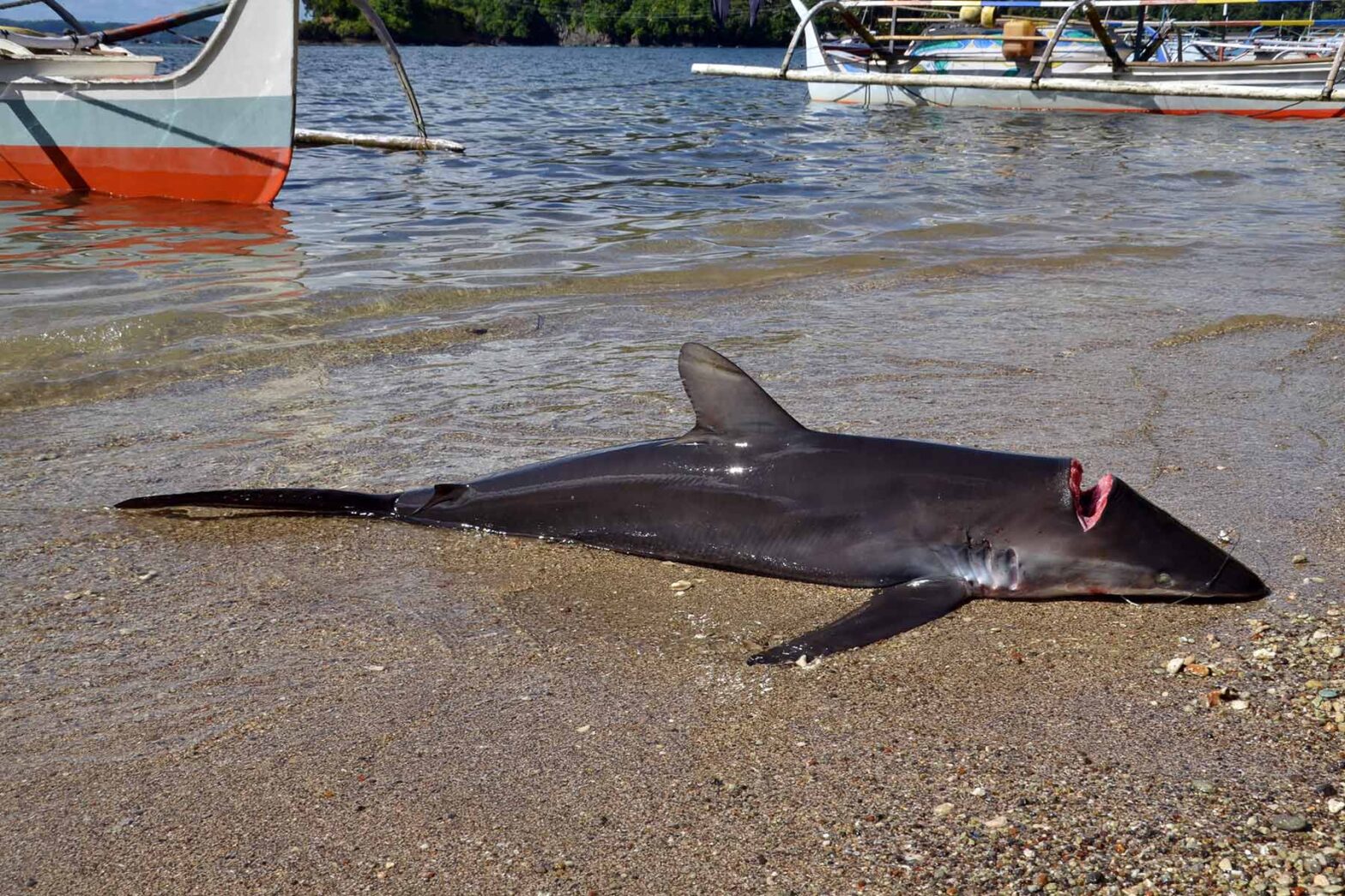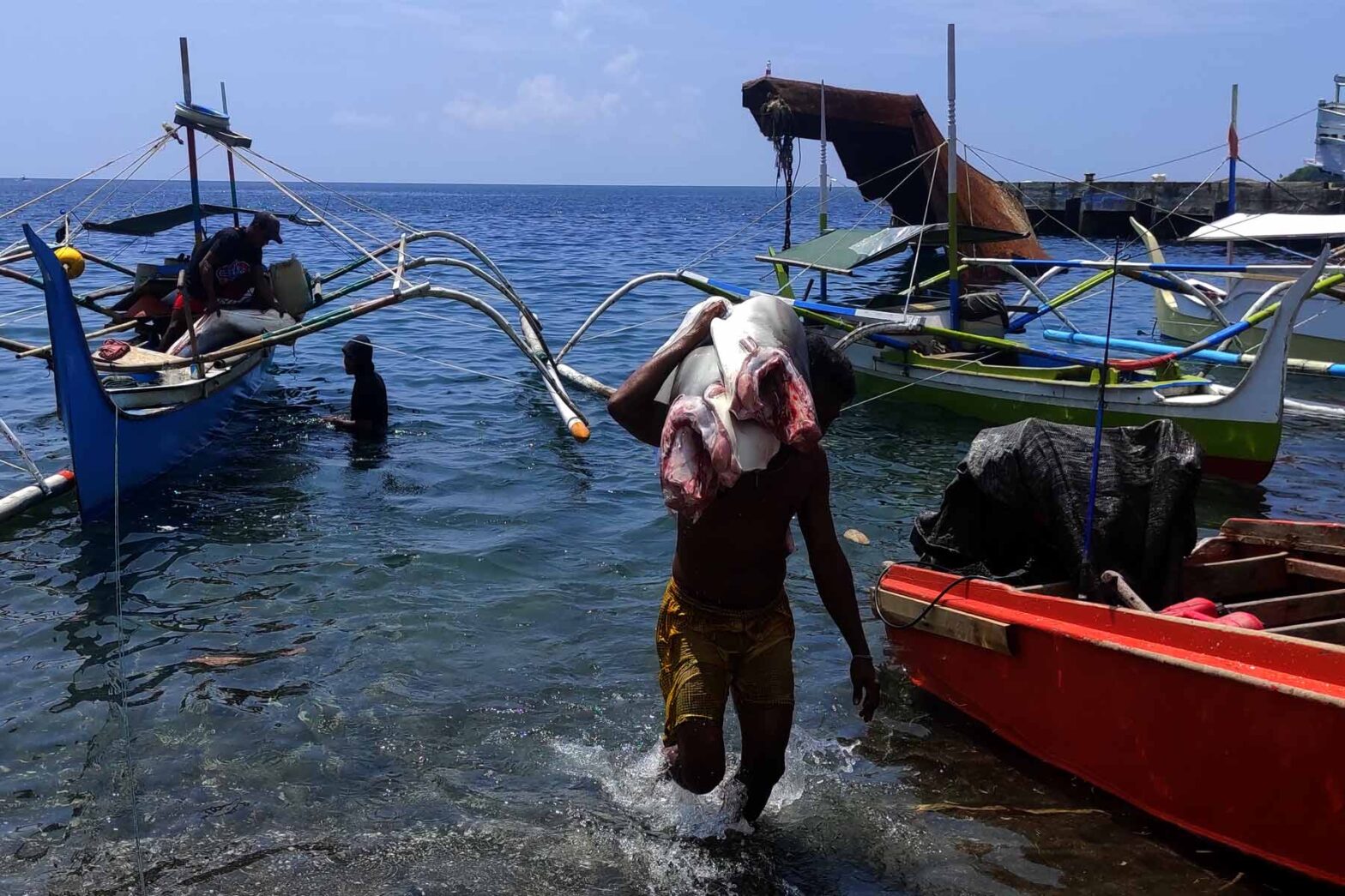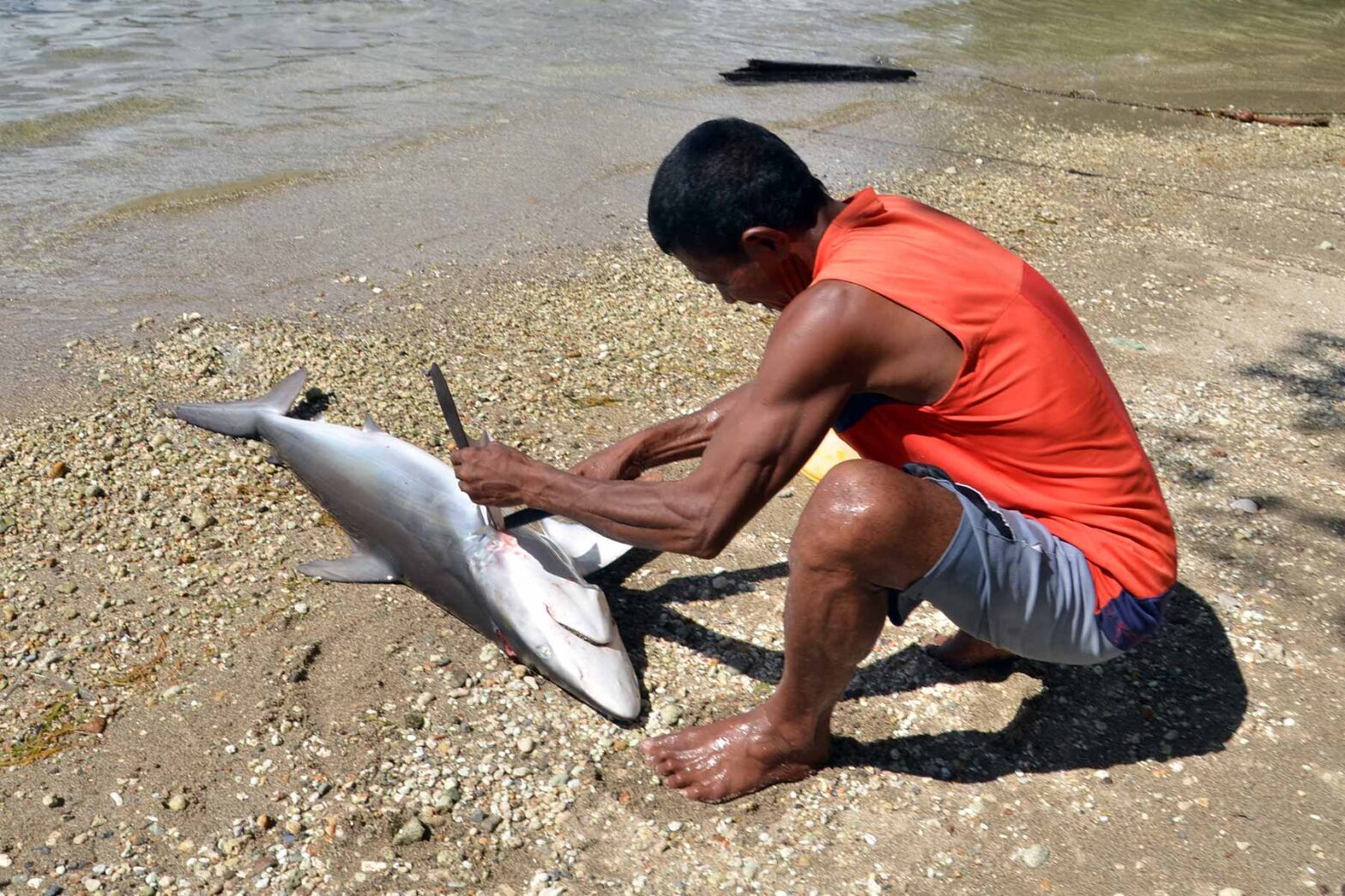The coordination of institutions overseeing fishing and product distribution in Sangihe could use some harmony to improve monitoring and data collection.
Timotius Lesewengen, a shark fisherman from Batuwingkung, an island in the Tabukan Selatan sub-district of Sangihe Islands in North Sulawesi, recalled that once an official from the Tahuna Maritime and Fishery Resource Supervisory Station (PSDKP) came to the island and asked fishermen to stop hunting sharks.
“When we asked him what would be the solution if we stopped catching sharks, he could not give any,” Lesewengen said.
The head of the Tahuna PSDKP station, Bayu Suharto did not deny this. Suharto said that his station was indeed tasked with the supervision of permits and fishing. He added that their supervision was more focused on the border area between Indonesia and the Philippines, which the Sangihe Islands is part of.
“The majority of our monitoring activities focus on educating and socializing the community. This includes the types of protected species or caught. So it’s not just about sharks. Moreover, not all sharks are protected. Species that are included in Appendix II can be caught but cannot be exported. Only traded domestically,” said Bayu, when met him at his office on Monday (13/6/2022).
While shipping and distribution of fish products, Suharto said, falls under the authority of the Tahuna Fish Quarantine, Quality Control station (KIPM).
“As far as I know, the shark species they catch in Sangihe are mostly those in Appendix II that are still allowed to fish. The local name is menehe (gray reef sharks). We also have consulted this with the KIPM and that is indeed still allowed,” he said.
Suharto said that based on PSDKP supervision, shark trading was not large-scale in Sangihe. Although he admitted that there were shark fin collectors in the area, he said they were small. Some of the collectors also held permits issued by the Marine and Coastal Resources Management office (BPSPL).
Suharo said he did not know whether the Tahuna PSDKP actually monitored the number of sharks caught in Sangihe. He added that authority lies in the BPSPL’s hands.
“BPSPL does not have staff in Sangihe. In North Sulawesi the big buyer is PT Rohtadi located in Manado. The Bitung PSDKP supervises the company. But because there are also collectors in Sangihe who use the quota given to this company, we are also checking the permits of PT Rohtadi,” Suharto said.
When asked whether shark fins were traded to the Philippines, he said he had no information on that.
“On whether it is sent to the Philippines, I have no information yet. Our ship that operates in the Indonesia-Philippine border area was last there in March 2022. But we have not monitored the small boats that come and pass through the unofficial routes and trade in other goods,” he said.
Met separately, the head of the Tahuna KIPM station, Geric Lumiu said that his office collected data on commodity traffic in all fish types, not only specifically on sharks. All suppliers or anyone shipping fish products out of Sangihe is under the obligation to report and register.
“All fishery commodities leaving out of Sangihe must have a quality guarantee certificate from the KIPM station. Today there is an online service and the requirements are easy. One only needs to attach an ID card, a tax ID, and a business permit from the village or the urban ward,” he said.
Lumiu confirmed that fishery commodities, especially those to be shipped out of Sangihe that were not certified, would be detained at the port of destination. This could be in Manado or in Bitung.
“Our personnel are at the harbor. They are already on standby at 0:430 Eastern Indonesian time. And all incoming or outgoing ships are monitored. We take turns to guard. We will check every expedition. And they must have a certificate from KIPM station. So far, we can still monitor the traffic in fishing commodities,” Lumiu said.
Echoing Suharto, Lumiu also expressed hope that BPSPL personnel could be stationed in Sangihe. Even more so, he said, after he obtained a letter from the Director General of Marine Spatial Management on December 10, 2021. This letter specifically requested that shark products shipped out of the district must obtain a recommendation letter from BPSPL.
Without BPSPL personnel, identifications are still conducted by the KIPM. The local official in Tahuna assists by taking photos and videos of the shark samples to be tested which are then sent to BPSPL.
“The BPSPL chapter in Manado will identify and then make a recommendation. It is indeed the duty of the BPSPL to identify the shark species because we at the quarantine station are not privy to the types of sharks,” Lumiu said.
Lumiu added the main duty of KIPM staff is to calculate the volume and ensure the quality of the product. “In this case, it would be better if there were a BPSPL representative on duty. We hope that they can conduct direct identification on site,” Lumiu added.
According to Indri, a staff member of the Makassar BPSPL’s Manado chapter, PT Rohtadi often requested shark fin recommendations for export. Manado is the only shark fin export gate in North Sulawesi.
Before they can be exported, shark fins have to undergo verification by BPSPL personnel.
Indri, one of the verifiers herself said that her office would conduct verification whenever an export recommendation is needed. She said that the Manado chapter of the BPSPL Makassar only has six personnel and verification is conducted by two personnel each time.
She said that verification could take up to two days when the number of shark fins to be verified was huge.
‘So far, we have never found shark fins from protected species,” Indri said in her office in August 2022.
Indri’s explanation contradicts our findings in Batuwingkung and Petta. From direct observation and recognition from several fishermen, they still often catch protected shark species. And the fins are also sold to collectors.
Meanwhile, based on the Decree of the Directorate General of Marine Spatial Management Number 49 of 2021 concerning the determination and distribution of export quotas for limited protected fish species and or fish species listed in Appendix II of CITES, there are 27 companies in Indonesia that have shark export quotas.
PT Rohtadi is not listed in the document. There is not even a company in North Sulawesi listed with an export quota.
We tried to visit PT Rohtadi’s office in Jalan Sam Ratulangi Number 61, Neighborhood II, Tanjung Batu Manado. We also visited its fish processing unit (UPI) on Jalan Tikala Kumaraka, Neighborhood III, Number 23.
There was no company sign at either location. There also weren’t any visible activities. The building was always closed when we visited several times.
From documents obtained from the Environmental Justice Foundation (EJF), PT Rohtadi has been recorded shipping (exporting) shark fins overseas. Both by sea and air.
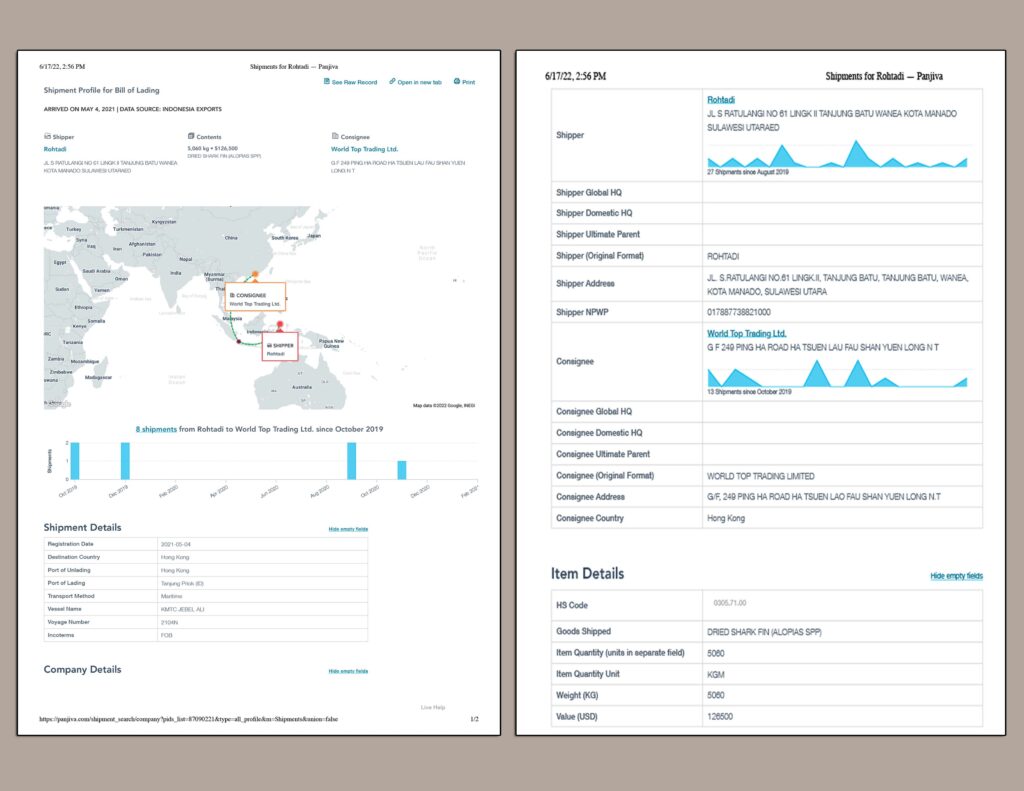
Quoted from a Ministry of Marine Affairs and Fisheries press release, PT Rohtadi allegedly tried to send illegal shark fins from Bau-Bau and Dobo to Manado to be sold from Manado. The activity is illegal because it lacks documents for collection and transportation from the two regions.
Officers found 4,030 kilograms of shark fins. The amount is almost double what was originally explained by the company representative who said it was only around 2,450 kilograms.
“PT. R has a license for the North Sulawesi area, but is trying to bring in illegal shark fins from Dobo and Bau-Bau to then allegedly be traded as if they were legal from Manado,” said Director General of Marine Resources and Fisheries Monitoring, Rear Admiral Adin Nurawaluddin as quoted from the press release.
Nurawaluddin added, they also found six types of shark fins to send to Manado. These fins came from protected shark species listed in Appendix II of CITES.
Against these violations, Adin ensured that his party would proceed legally in accordance with the applicable laws and regulations.
“We will impose strict sanctions. This is certainly a serious and substantial violation to teach other business actors not to violate the law,” said Adin.
This is the final story of a 4-part series produced with support from the Environmental Justice Foundation and Tempo Institute. It was first published in Bahasa Indonesia by Zonautara on March 18, 2023.
